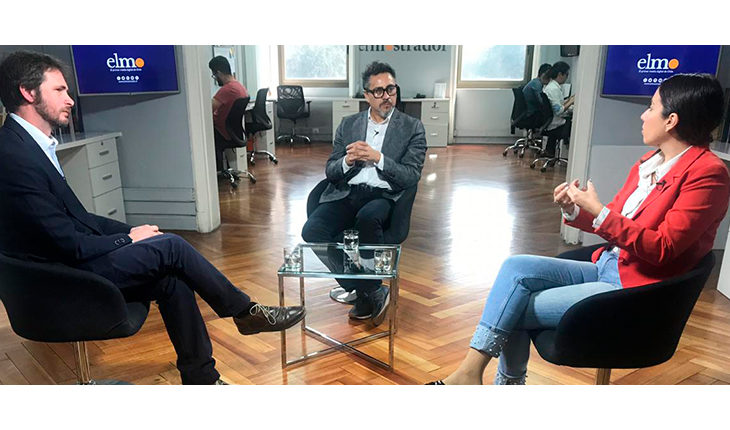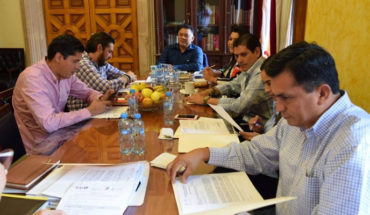Corruption was the main theme of the new episode of the week policy. Panelists El Mostrador, Héctor Cossio and Natalia Saavedra spoke with the investigator of public space, Manuel Arís on the low credibility of the citizens in their institutions as a result of recent cases that have been given to know, such as the corruption of three judges of the Court of appeals of Rancagua, involved in influence peddling.
For Aris, that this case has occurred in the judiciary is “a worrying sign”, since this power “seemed that it was not involved in these types of cases”. “If one sees that situations such as this, where there might be peddling is given in the Court of appeals, are about what one would expect downward when we establish that corruption often behaves pyramid?”, questioned the general editor counter.
To respond, Aris used a cliché: “there are no countries or institutions that are free of corruption. What makes the difference between corrupt countries or countries that are not corrupt is the way they react to corruption. Obviously the judiciary in Chile this with threats of having a corruption is tremendous damage to our coexistence. We cannot allow ourselves that because it would mean a State of degradation that obviously we have to prevent it from happening at all costs”.
The solution, according to Aris, is the speed with which it reacts: “the important thing is that those cases hopefully remain limited, which produce reactions, which produce reforms that are limiting the discretion that certain officials, certain” “authorities, so that these cases of corruption to happen again”.
“Saavedra, in that sense, questioned the reforms that prevent corruption exemplifying with another fact linked to it, which was news last week: the kinds of ethics which began to receive handlers of Penta, Carlos Alberto Délano and Carlos Eugenio Lavín:” How will I distorting the image with these punishments that seem too lax for acts that we have known up to now as acts of corruption? “.” There is a sense of widespread impunity and that is a breeding ground for corruption to play,”said Aris, referring to if citizens see the great authorities is corrupt, they will feel motivated to”escape the passage of micro or Rep “small oducir corruptions”.
“Why no then a widespread punishment?”, asked Saavedra, which was answered by Aris, indicating that after the corruption cases which occurred between the years 2014 and 2015 was reformed, “in well ambitious way, punishments that will get people to commit this illicit”.
“We have to wait a new case then to meet them,” retorted the counter markets editor.
Council for transparency 2.0 to avoid that to happen new cases of corruption in the judiciary or in the armed forces, the three panelists of the week policy agreed that the “civilian power has to exercise some sort of control over these” irregularities that we observed,”as said Cossio.
“That’s where our institutionality is failing and is a diagnosis that was established for quite some time that civil authority can not supervise or force a military or judicial accountability”, said Aris.
“Other countries have pointed to the rules that each institution may not have its own system of transparency”, indicates Saavedra, which is just what the Government is seeking to reform the law on transparency. For Aris this project, called also as Council for transparency 2.0 “what you want instead of positioning the Council for transparency as the body guiding and promoter of transparency for public institutions in general in Chile, what it does is breaking down the system”.
Saavedra described this reform as a very particular: “it seems very strange that each institution disintegrates and make its own system of transparency, with its own rules with their own tips and then there are pure miniorganismos of transparency that may “have different opinions of what is informable citizens, what is it that transgresses public safety”.
“Generates a very reasonable doubt that will hide, which is a mechanism to hide information”, said Cossio.
Corruption as a result of the foregoing, the citizenship education has lost ability to wonder about new cases of corruption. “People often talk about with much property that everything is corrupt, that not striking them than in the judiciary there are corruption, not striking them that occurs in the police, which take place in the army, which take place in the municipalities “, in political parties, that occurs in high entrepreneurship”, analyzed Cossio. How can this feeling to citizen level improve?.
According to Aris, there are worrying data on this subject, but there are also many encouraging data: “one year to another rose 10 points intolerance to corruption. 64% to 74% it says that not it would vote for a candidate as well. That gives an account of that, perhaps in these informal talks to say that they are all corrupt, but when voting for example a corrupt candidate at least in speech, unless the Chilean population still maintains a tolerance for the corruption that is a capital that we must protect and promote”.
For that, civic education, is key as shown in Saavedra: “It is important civically engaged you educate generations about what is corruption”. “We must stimulate the complaint. Because, usually in the public domain, who denounces also is damaged from the summaries that are made against. The armed institutions, it is seen as a betrayal. They are disrupted cultural values,”said Cossio.
“It is true that the confidence in institutions has decreased dramatically in the last decade, the legitimacy of the institutions is very damaged, the image of the political actors and the public actors has much declined in recent years, and those are signs that We have to worry about because they deteriorate at the end of the day our coexistence,”he said.
translated from Spanish: The political week: corruption in the powers of the State and the sense of impunity as a breeding ground
April 10, 2019 |





